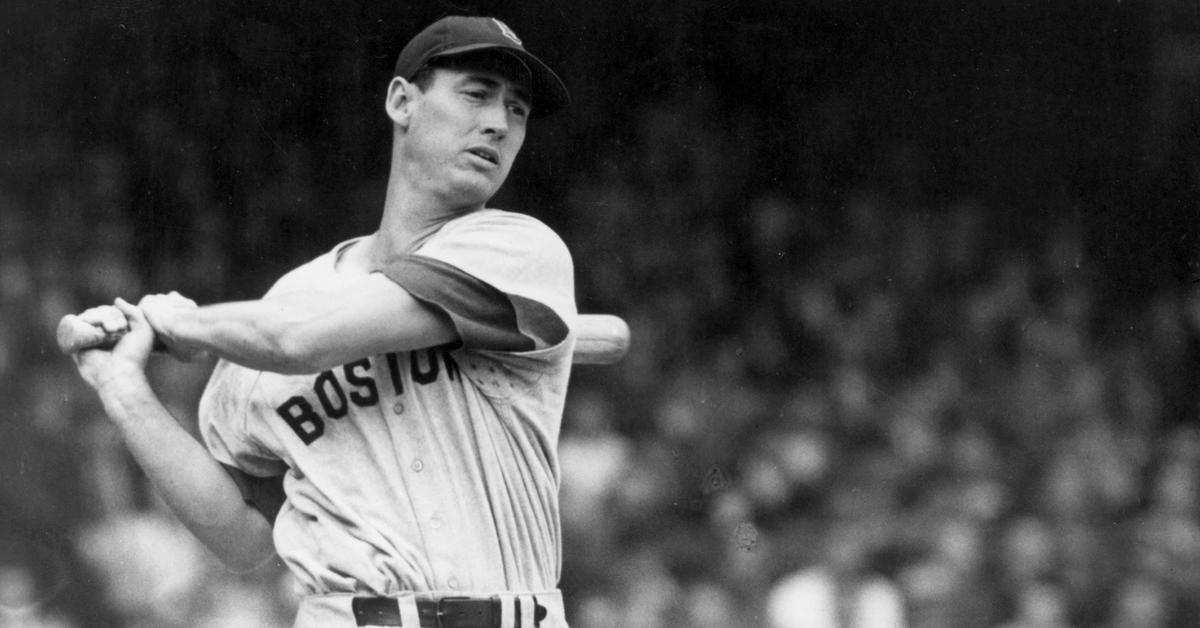Ted Williams
Ted Williams is known by many as the greatest hitter in the history of baseball, and he would have been one of the 5 greatest players ever if military service hadn't interrupted his career.
Williams was an immediate success when he arrived in Boston in 1939, leading the league in ERA as a rookie with 145, becoming the first rookie ever to lead the league in that category. The Rookie of the Year award did not exist yet, but he would have won it easily if it had.
In his third season, he had a memorable year. He hit .406, which is still the highest average by any player in the past 90 years, and the last time a player hit .400 for a full season. He also led the league in runs, home runs, walks, on-base percentage, and slugging percentage, but did not win the MVP because of Joe DiMaggio's record hitting streak.
The next season he led the league in all of the same categories, and added RBI's to the list as well, which earned him his first Triple Crown, but he was once again deprived of the MVP he earned, finishing as the runner-up for the second year in a row. It would be a few years before he got to compete for an MVP again, because he was drafted into the Army to fight in World War II.
When he returned to Boston in 1946, he had not lost a step. He led the league in runs, walks, on-base percentage, and slugging, and led the Red Sox to the pennant, which meant that he was able to play in his first and only World Series. Unfortunately, he was hit by a pitch in an exhibition game just prior to the series, and it prevented him from swinging freely, resulting in a series loss.
He was great again for the next couple years, including another Triple Crown in 1947, then had an amazing season in 1949, when he led the league in doubles, homers, runs scored, RBI's, walks, on-base percentage, and slugging. He fell just .0002 short of the batting title that year, depriving him of a 3rd Triple Crown, and also set a record by reaching base in 84 straight games, which is still the record today, and received his 2nd MVP, though it should have been his 6th.
He missed a good chunk of the next season with a broken arm, but came back strong in 1951 to lead the league in walks again, his 7th consecutive full season leading the league in that category. He hit over .400 in both 1952 and 1953, but only played a total of 43 combined in those seasons due to being called back into active military duty in Korea.
He led the league in walks and on-base percentage again in 1954, which made 9 straight full seasons leading the league in on-base percentage. He retired before the start of the 1955 season, but changed his mind a couple months in and came back to the lineup to finish the season. Over the next 3 seasons he led the league in on-base percentage again each time, along with 2 more batting titles, the final one coming when he was 40 years old.
Williams was known for his patience at the plate, and it was said that he never swung at the first pitch, feeling that it allowed him to get a feel for the pitcher's "stuff." This allowed him to get on base with greater regularity than any other player ever, with a .482 career on-base percentage that is the best of all time.
He also has the highest batting average of any player who began playing after 1920, and is #8 all time in that category. He is among the top 20 all time in runs, home runs, and RBI's, and is #4 in walks. He was considered by most to be a liability in the field, but there is no doubting that he was one of the greatest ever at the plate, would probably have been the second-greatest player of all time if he hadn't missed nearly 5 years to the military, and is definitely one of the greatest players of all time.

No comments:
Post a Comment